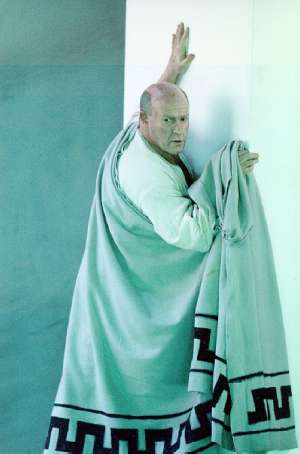|
LISTENING TO THE SOUL'S ECHO

RODERIC DUNNETT on Tippett's opera King Priam
<< Continued from page 1

John Daszak as Achilles. All photos in this article by Bill Rafferty
Overseeing English National Opera's production of King Priam is
the gifted Irish-born director and designer, Tom Cairns, who is no stranger
to 20th Century opera and musical : his credits range from Birtwistle's
The Second Mrs Kong (at Glyndebourne) and Janacek's Jenufa
(for Opera North) to Stephen Sondheim's brilliantly successful Sunday
in the Park with George at the National Theatre.
Cairns has also picked up several awards for his recent television work
for BBC2 (notably the John McGahern adaptation Amongst Women, and
Jim Broadbent's A Brief Encounter), and sees a connection :
'There's an almost filmic quality to the way Tippett has selected from
the Troy story, which I think is one of its great strengths. It's incredibly
focused.
'In each scene Tippett manages to distil the core of the myth, or narrative,
and deliver it with a very striking, almost classical spareness and economy,
both musically and dramatically. It's undoubtedly strong on story - he really
does take his audience on a journey with him. And every scene has a definite
pace, a rhythm, a dynamism.
'Tippett's writing is remarkably spare in places - for instance, in Act
II, where the Trojan War rages and he leaves out the orchestral strings
entirely, focusing on brass and woodwind, and writing some very harsh, stark,
acerbic music - only to bring the strings back, to ravishing effect, at
the start of Act III.'
Much of the opera's characterisation hinges on his use of dramatic monologue,
 in
which the central figures - Achilles, Hecuba, Hector, and above all, Priam
himself - face up to the agonising choices each has to make. Often these
recitatives and arias are accompanied just by a solo instrument (violin
for Hecuba, cello for Andromache, guitar for Achilles), or by a concentrated
small ensemble. in
which the central figures - Achilles, Hecuba, Hector, and above all, Priam
himself - face up to the agonising choices each has to make. Often these
recitatives and arias are accompanied just by a solo instrument (violin
for Hecuba, cello for Andromache, guitar for Achilles), or by a concentrated
small ensemble.
Three of the characters form a kind of Greek chorus - an old man, or
soothayer; an old woman, or nurse; and a young guard. This enables Tippett
not only to maintain the story narrative and link the scenes (which cover
events spanning some thirty years) but also to comment on the action and
draw conclusions from it. The principal women double as the three goddesses
who appear in the 'Golden Apple' scene at the end of Act I, where Paris
makes his fatal choice. And Tippett also introduces Hermes (Mercury), as
not merely a link between Gods and humans, but also (in Jungian terms) as
some kind of mediator between the concious and unconscious world.
But the key figure in the opera, sung by Andrew Shore, is Priam himself
: 'Only at the end,' explains Cairns, 'does Priam stop blaming himself for
the decisions he has made. He reconciles himself to having made the choices
he did, and embraces his own death serenely (- quite the opposite of Virgil's
grisly account). By that stage he has changed, and learned.
'It's as if Tippett were saying that the only right way to live is to
listen to your own heart. He captures that in a marvellous moment in the
opera, where the nurse says to him something like, 'Listen to the soul's
echo', and an almost angelic chorus sound is heard - as if it came from
the airwaves. As long as you listen to the best part of yourself, not the
negative aspect, he seems to imply, then you will have no reason for regret.
It's a very transcending, beautiful moment.'
Copyright © Roderic Dunnett, October
28th 1999

| This highly acclaimed ENO London production of King Priam,
shared with Opera North and de Vlaamse Opera, Antwerp, runs in repertory
at English National Opera
until 5th November. Further performances: Fri 29 Oct, Wed 3 Nov, Fri 5 Nov.
Seats available at all prices from GBP 5-45. Telephone the ENO Box Office
on +44 (0)20-7632-8300). |
<< Music &
Vision homepage Grande
Messe des Morts >>
|